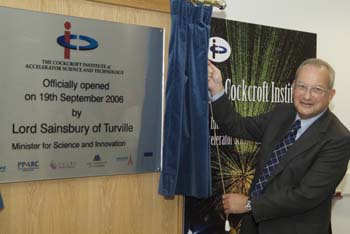UK Particle Physics Steps on the Accelerator Pedal

A major research centre opened by Lord Sainsbury this week (19th September), is set to bring the UK to the forefront of international efforts in Accelerator Science and Technology. The Cockcroft Institute will be a national focal point for UK scientists and companies to develop cutting-edge accelerator technologies for major new projects such as the International Linear Collider and a Neutrino Factory.
The Cockcroft Institute was officially opened by Lord Sainsbury, Minister for Science and Innovation, in the presence of the children of Sir John Cockcroft, the Nobel prize-winner who is regarded as the founder of modern accelerator research.
Dr Rebecca Seviour of Lancaster University’s Engineering Department was one of the first appointments to the Cockcroft Institute
She is a member of the Microwave Research Group at Lancaster and of the Cockcroft Institute and has special expertise in the design of normal and superconducting cavities for particle accelerators and an extensive background in materials science on microscopic electronic transport.
Dr Seviour is spearheading the Cockcroft institute’s generic RF cavity research program.
The other appointee from Lancaster University is Dr Jonathan Gratus from the Physics Department.
“I’m ecstatic because it’s an exciting position and there are lots of things that I can work on.There are lots of challenges in accelerator physics that need a more theoretical approach which mathematical physicists can provide.
“Because we’re constantly pushing the frontiers of accelerator design, the computer software used is also being pushed to the limit so we need to improve that.We’ve already got interesting models and ideas and I’m looking forward to getting started.”
Accelerator science underpins a wide range of scientific disciplines, from medical imaging, photon and neutron sources for studying materials and biological structures to particle colliders that recreate the conditions shortly after the Big Bang. Some of these projects are constructed on a global scale – the next machine to be built in particle physics is so large that there will only be one in the world – the International Linear Collider (ILC).
Professor John Dainton, Director of the Cockcroft Institute said “The International Linear Collider is currently under design in a co-ordinated global effort. It will collide electrons with their antimatter partner, positrons, creating interactions which will reveal how the evolution of the Universe began in its earliest moments It will provide answers to the most basic questions about the laws which govern this evolution.”
He added “UK researchers are deeply involved in the development of a number of new technologies, all of which address the critical issue of how to produce beams of sufficient intensity, and how to make them collide head-on.”
The Cockcroft Institute was set up by the Particle Physics and Astronomy Research Council (PPARC) in partnership with the Council for the Central Laboratory of the Research Councils (CCLRC). The Cockcroft Institute is located on the newly opened Daresbury Science and Innovation Campus and is a joint venture of the two research councils with the Universities of Liverpool, Lancaster and Manchester and the Northwest Regional Development Agency (NWDA).